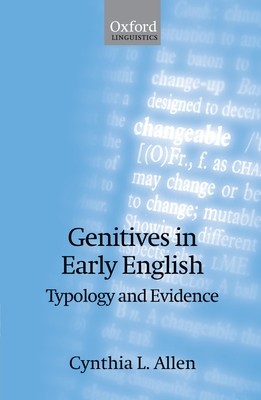
- We will send in 10–14 business days.
- Author: Cynthia L Allen
- Publisher: Oxford University Press, USA
- ISBN-10: 0199216681
- ISBN-13: 9780199216680
- Format: 15.8 x 23.6 x 2.5 cm, hardcover
- Language: English
- SAVE -10% with code: EXTRA
Reviews
Description
This book examines the evidence for the development of adnominal genitives (the knight's sword, the nun's priest's tale, etc.) in English. During the Middle English period the genitive inflection -es developed into the more clitic-like 's, but how, when, why, and over how long a time are unclear, and have been subject to considerable research and discussion. Cynthia L. Allen draws together her own and others' findings in areas such as case marking, the nature of syntactic and morphological change, and the role of processing and pragmatics in the construction of grammars and grammatical change.
Using evidence derived from a systematic examination of a wide range of texts, Dr Allen reviews the evidence for the nature of the possessive inflection in earlier stages of English and the relationship of the -es possessive to the 'his genitive. In doing so she shows that Middle English texts are more reliable witnesses to the grammar of Middle English than has sometimes been assumed. The texts may have been conservative, but their language, the author argues, is reasonable reflection of the spoken language, and where the written evidence runs counter to typological generalization about syntactic change it may be the latter, not the former, which is in need of qualification. While the book focuses on Middle English it also contains discussions of linguistic change before and since, and draws on comparative evidence from other languages, particularly Germanic languages such as Swedish and Dutch. This ground-breaking book will be of great interest to scholars and students of MiddleEnglish in particular and the history of English in general.
EXTRA 10 % discount with code: EXTRA
The promotion ends in 15d.06:37:04
The discount code is valid when purchasing from 10 €. Discounts do not stack.
- Author: Cynthia L Allen
- Publisher: Oxford University Press, USA
- ISBN-10: 0199216681
- ISBN-13: 9780199216680
- Format: 15.8 x 23.6 x 2.5 cm, hardcover
- Language: English English
This book examines the evidence for the development of adnominal genitives (the knight's sword, the nun's priest's tale, etc.) in English. During the Middle English period the genitive inflection -es developed into the more clitic-like 's, but how, when, why, and over how long a time are unclear, and have been subject to considerable research and discussion. Cynthia L. Allen draws together her own and others' findings in areas such as case marking, the nature of syntactic and morphological change, and the role of processing and pragmatics in the construction of grammars and grammatical change.
Using evidence derived from a systematic examination of a wide range of texts, Dr Allen reviews the evidence for the nature of the possessive inflection in earlier stages of English and the relationship of the -es possessive to the 'his genitive. In doing so she shows that Middle English texts are more reliable witnesses to the grammar of Middle English than has sometimes been assumed. The texts may have been conservative, but their language, the author argues, is reasonable reflection of the spoken language, and where the written evidence runs counter to typological generalization about syntactic change it may be the latter, not the former, which is in need of qualification. While the book focuses on Middle English it also contains discussions of linguistic change before and since, and draws on comparative evidence from other languages, particularly Germanic languages such as Swedish and Dutch. This ground-breaking book will be of great interest to scholars and students of MiddleEnglish in particular and the history of English in general.


Reviews